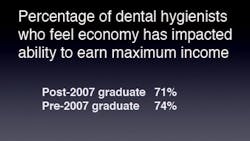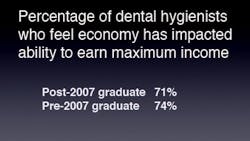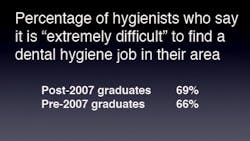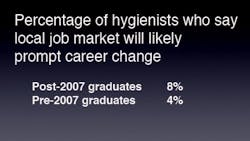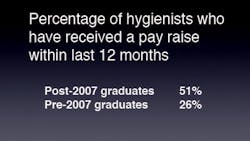RDH eVillage Salary Survey, Part 1: The kids are all right
The trick question introduced into the questionnaire for the 2012 RDH eVillage salary survey asked participants if they graduated from dental hygiene school before or after December 2007, which, according to many economists’ opinions, is when the U.S. economy turned sour for the next five years. The question replaced a traditional query in the survey about how long dental hygienists have been practicing.
Did you put on that cap and gown before or after that Christmas season when Led Zeppelin reunited for a London concert five merry seasons ago?
(Honey, don’t ask the kids about an ol’ baby boomer band!)
We were like kids in a candy store, though, when we wanted to dedicate the first installment of the 2012 RDH eVillage salary survey to determine if the kids are all right.
(Honey, not every dental hygienist who graduated within the last five years was in his or her 20s on graduation day.)
PARTICIPATE:Offer your input into the salary survey
READ:Articles from last year’s RDH eVillage salary survey
READ:The 10 best states to be a young dental hygienist
Our alter ego is correct. But after five years of building more dental hygiene schools for the profession, and everyone from Money magazine to the federal government forecasting that dental hygiene would be the “dream job” of the future — all during the middle of a down economy where hygienists faced reduced hours, reduced wages, and diminishing self-esteem — we want to know if the kids are all right, don’t we?
Well, the kids are all right, or at least in the same boat as veterans in most of the categories below. The discrepancy on recent pay raises is likely due to a common trend of employers perceiving that veterans reach a ceiling on pay, and raises occur in less timely intervals.
Upcoming articles based on the RDH eVillage salary survey will address statistics on current pay levels in states, as well as other employment issues. Again, dental hygienists are invited to participate in the survey by clicking here.
Finally, comments from all readers about salary trends will be featured in upcoming articles too, regardless of work experience. But since this article focuses on dental hygienists who graduated after the economic downturn in 2007, we included the following specific comments from the “kids,” many of who are now veterans themselves with approximately five years of experience.
• I think that for new dental hygienists, it will benefit you to have some dental assisting experience before going into the field. I had five years of dental assisting experience and am now working full time. Many of the girls I graduated with in 2011 are still unemployed. I’m from West Michigan and jobs are few and far between here. Many people are leaving the state.
• I have been at my employer less than a year so I have not had a raise. I am a recent graduate of dental hygiene school but I’m an older graduate (44). I had several years of assisting experience so my new employer was willing to give me a higher rate to start off.
• There are hardly any full-time jobs (four days), and most offer no benefits. As hygienists, we are largely treated as a private contractor and must provide our own health insurances, retirement, etc. It’s very difficult when we have no sick pay or vacation pay, unlike other professions. I really regret this career. We abuse our bodies working on patients who will not recline to allow us to work in ergonomic positions. So we injure our bodies and then we’re unable to work. I would never recommend this profession to anyone. It will not sustain a long career. I am looking to find a full-time job outside of dental that offers benefits, retirement, insurance, sick pay, and vacation pay and that will not disable my body.
• I’ve never been offered a raise in my four years of employment as a hygienist. I work at a high-tech office that usually stays busy and fast-paced. I commute 45 minutes each way. New job opportunities are rare. I’m grateful for steady employment, but I do feel I deserve a raise.
• Part time work = no benefits, and that’s what most of the hygiene jobs are now. I would like to see RDHs be able to open their own practices some day, practices where referrals would be made to the dentist as needed. We need more versatility in our profession.
• Kansas allows dental assistants to become supragingival scalers. Many offices don't employ a hygienist and use "scalers" in their place. Patients are for the most part unaware they’re receiving care by an unlicensed person and are charged the same fees for "prophies." I have patients from other offices transfer in who had "regular cleanings" every six months, but who have rampant periodontal infections and subgingival calculus and have no idea anything is wrong. I think it is a terrible violation of patients’ rights. I educate everyone I can about what a "cleaning" is supposed to entail. I think our state and national associations should do an ad campaign to make the public aware. Until patients demand proper treatment I don't think things will change. In addition to the "scalers," we have five hygiene schools within a day’s drive and not enough jobs for all the new graduates.
• Most jobs are filled by word of mouth. I do know dental hygienists who have lost hours due to slowed business, and many are looking for hours. There are no full-time positions at all.
• I was unemployed for six months before finding a position in a town an hour away from my home. There are no jobs unless you know someone who knows someone. Dental hygiene was not a smart career choice.
• Dental hygiene is an awesome career. I love my job, my patients, and the people I work with. There are very few dental hygiene positions available. The dental hygiene schools are flooding the market. I suspect in the near future the average salary for a well-qualified hygienist will be much lower than it is today.
About the Author

Mark Hartley
Mark Hartley is the editor of RDH magazine and collaborates with Kristine Hodsdon on many of the articles for RDH eVillage, which also appear on DentistryIQ.com.
